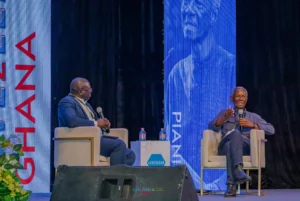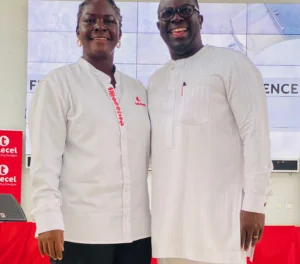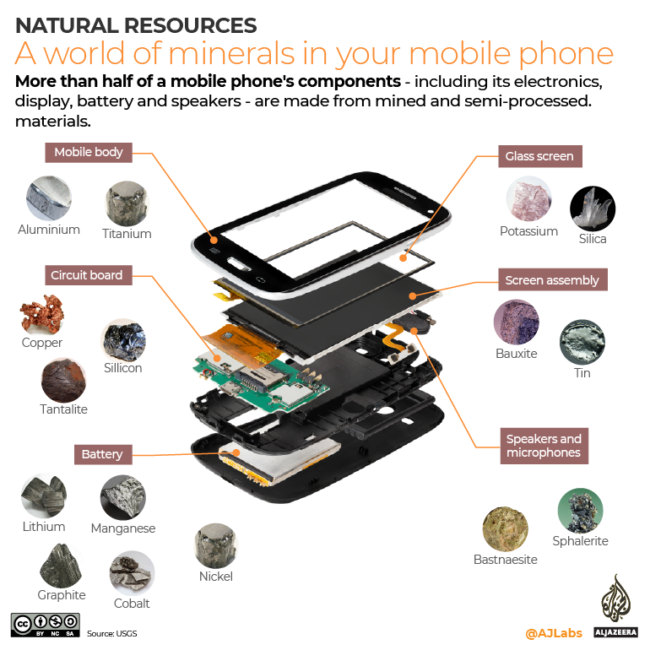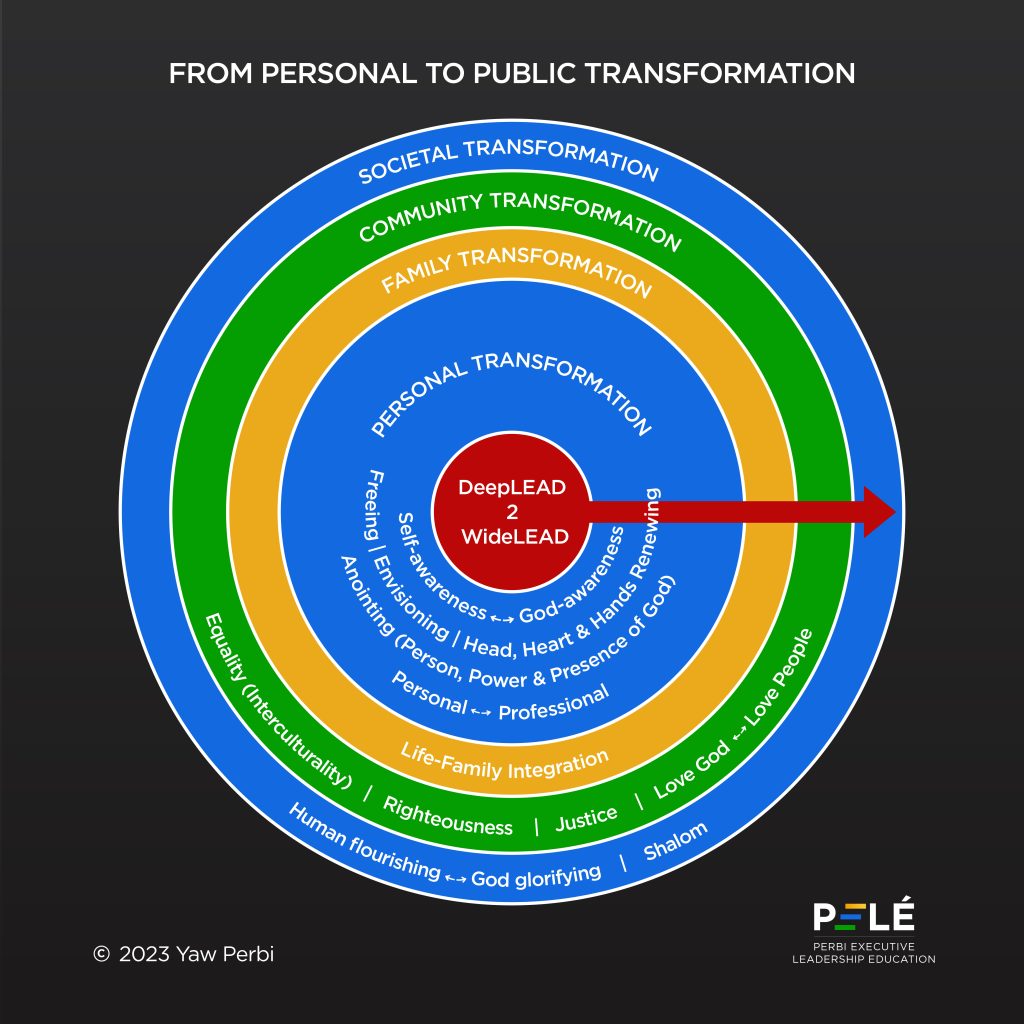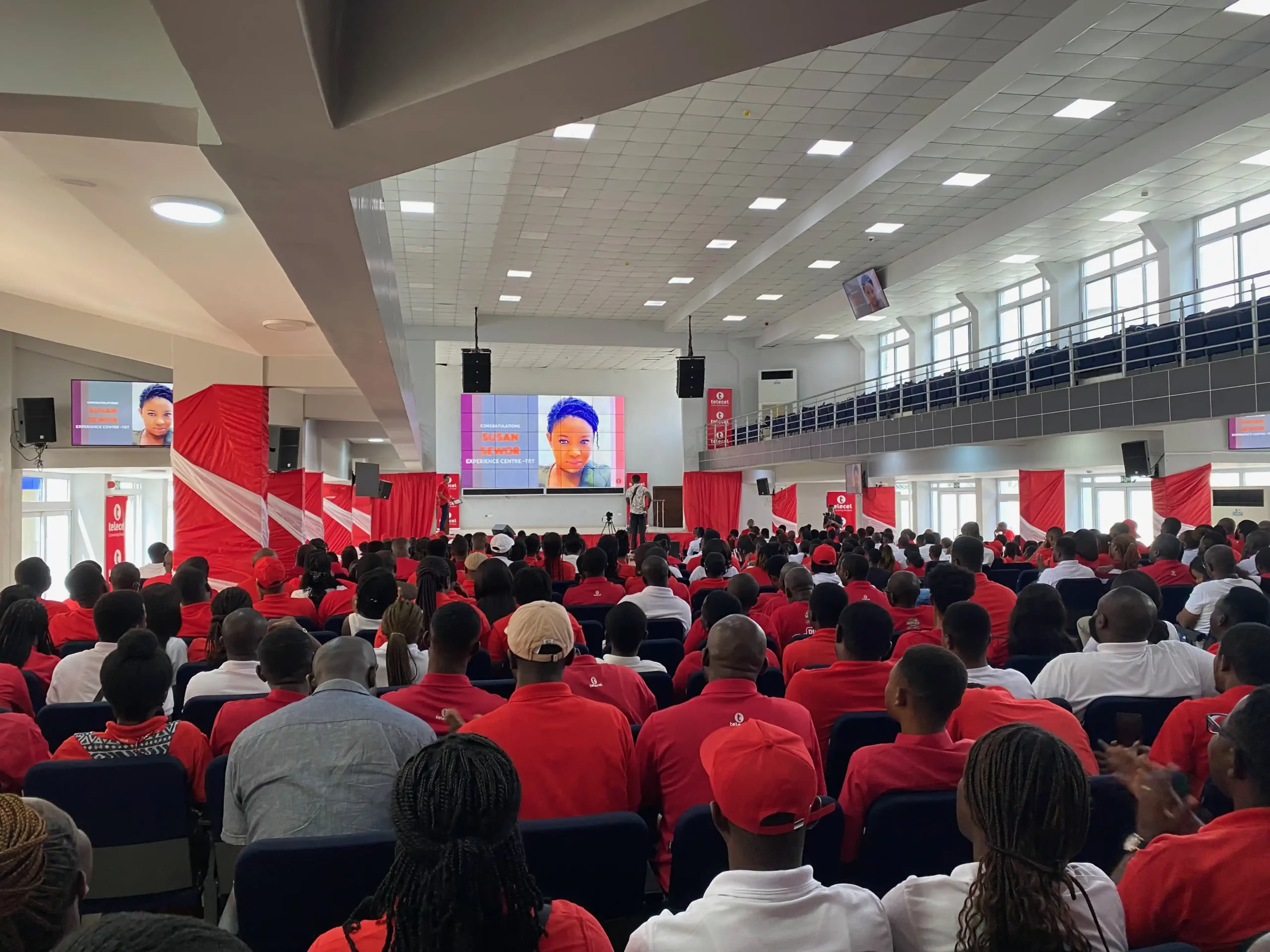
INTRAPRENEURS: THE ENTREPRENEURS WITHIN
INTRODUCTION
Telecel Ghana, formerly Vodafone Ghana, has an amazing annual practice of bringing together its 1,300-strong frontliners to appreciate them—not just with words but in awards—and ginger them up to do even better for their clientele. This Frontline Engagement Conference, as they call it, typically happens during the global Customer Service Week in October, which they’ve extended to the whole month to appreciate their customers.
This year, as the principal coach/speaker/trainer at Perbi Executive Leadership Education (PELÉ), Telecel extended to yours truly the humbling opportunity to address their army of frontliners and frontline support staff. Frontliners mean everything to any business! They are essential workers whose jobs depend on in-person interactions and often involve some form of risk, even if it’s verbal abuse. If this were soccer, frontliners would be our strikers! No scoring on this front, no bottomline success. Period. I was particularly impressed that the CEO of Telecel, Ing. Patricia Obo-Nai, prioritised this event such that not only was she in attendance from start to finish, she was fully present and participatory to the max.
This article aims to summarise the keynote I delivered on behalf of PELÉ entitled, “WANTED: INTRAPRENEURS!” This burning message to the rank and file of a top-tier provider of digital and telecommunications solutions across the African continent is one which, quite frankly, every company and organisation needs to hear.
FUNNY BUT NOT FUNNY
Several years ago, I had an appointment in downtown Accra but needed to pass through the bank to make a transaction first. I waited and waited and waited… and it was becoming evident that I might miss my appointment altogether. So, I got up and approached one of the bankers to express both my frustration and concern that I needed to make it for an appointment and here I was stuck in the bank.
Here was her response (I kid you not; and I remember as though it were yesterday): “Nti wonni time na w’aba bank no?” she said in Twi. To wit, “So you don’t have time and you came to the bank?” Needless to say, I was stupefied; or rather, mortified. If there ever was the opposite of a staff being intrapreneurial, it is that!
DEFINING INTRAPRENEUR(SHIP)
Everyone knows about entrepreneurs and entrepreneurship. But what in the world is an intrapreneur—and then intrapreneurship? To cover our bases, Investopedia defines an entrepreneur as “an individual who creates a new business, bearing most of the risks and enjoying most of the rewards. The process of setting up a business is known as entrepreneurship. The entrepreneur is commonly seen as an innovator, a source of new ideas, goods, services, and business/or procedures” (emphases mine).
With that at the back of our minds, the simplest definition of an intrapreneur would be an employee who behaves like an entrepreneur. Rather than going out to create a new business/organisation, they stay within it and use their innate entrepreneurial aptitudes and attitudes to significantly grow it. Gifford Pinchot III (1985) defined intrapreneurs as, “Dreamers who do. Those who take responsibility for creating an innovation of any kind within an organisation.” He is credited with inventing the concept of intrapreneurship in a paper that he and his wife, Elizabeth Pinchot, wrote in 1978 titled “Intra-Corporate Entrepreneurship.” Intrapreneurs then, are entrepreneurs within–within themselves and within their organisations/businesses.
DIGGING DEEPER
Intrapreneurs have an attitude and style that integrates Responsibility, Risk-taking, Ownership, Innovation (ROI). I like that these basic characteristics spell ROI, literally portraying how it’s entrepreneurs who bring a company its best Return on Investment (ROI). Roi, the French word for king, is also apt, for intrapreneurs are royalty in establishments, they are the kings and queens of any business. In 2014, Forbes declared that intrapreneurs are the most valuable employees from here on out. “Social intrapreneurs are quickly becoming the most valuable employees at many companies because they are good for the bottom line, good for the brand, and good for staff morale.” [1]
At the core of ROI is ownership, owning the opportunities and challenges at the workplace, assessing situations and taking responsibility (the R again) for one’s attitude, behaviour and outcomes. Here is where I challenge Management about ensuring they provide the legal and logistical framework—as well as whatever enabling environment—that empowers employees to take initiative and risk to innovatively solve problems boldly. A great example is the Ritz-Carlton hotel chain which has for many years given staff $2,000 of discretion to be used to solve any customer complaint in the manner the employee feels is appropriate. And this is daily! I recall hearing the author of The New Gold Standard: 5 Leadership Principles for Creating a Legendary Customer Experience Courtesy of The Ritz-Carlton Hotel Company tease out how this incentive works in practice and that the training is that if a customer/guest/client reports an issue to you, you own it 100% up to $2,000 worth, and until it is resolved, irrespective of your job description at the hotel chain. If as a gardener, you are approached with a television problem you intrapreneurially solve it, even if it means buying a new $1,000 television for the client. You don’t say, “Oh sorry, I’m just a gardener;” and you definitely do not go pointing fingers at your colleagues in another department, much less diss them. You own it!
REAL VALUE, REAL STORIES
Apparently, “Over 70% of transformative innovations are conceived, developed and commercialised by employees working within large companies. This finding stands in stark contrast to how contemporary society currently celebrates entrepreneurs as heroes.” [2] The most world-famous intrapreneur story must be that of Art Fry and how he made his company 3M billions of dollars by discovering a great use of a unique adhesive another 3M scientist had developed five years earlier but had found no practical use for it yet. That is a short version of the success story of Post-It Notes. [3] Did you know that the 3M company, with 2023 revenue of $33 billion, and with a recurring spot on the enviable Fortune 500 list, owed a great part of its success to intrapreneurship? Adhesive paper of all things, for a company originally named Minnesota Mining and Manufacturing (later 3M).
In Africa, the phenomenal success of FinTech, is another triumph of intrapreneurship. A couple of years before Momo (MTN’s version of Mobile Money) would take Ghana by storm, two middle managers from Vodafone and Safaricom in Kenya launched the mobile payment product from within their established companies in 2007. [4] Calling it M-Pesa, last year it boasted 51 million customers, with Kenya as its largest market, accounting for over 30 million users, many of whom previously did not have bank accounts. The service notably handled 26 billion transactions in the financial year ending March 31, 2023. SMEs in Kenya hugely depend on M-Pesa to receive payments from customers to the extent that in the last financial year to March 2023, more than 606,000 businesses were receiving payments through Lipa Na M-PESA. [5] That too, is a triumph of intrapreneurship.
[Mr. Kwame Pianim being interviewed by Dr. Yaw Perbi at Live2Lead Ghana on October 4, 2024]
I am in the throes of properly documenting the various contributions to nation building of the Ghanaian Economist and statesman Kwame Pianim, arguably the most unsung intrapreneur in Ghana’s history. Working within government circles and later in an investment company he co-founded, he re-engineered Ghana’s pension scheme to provide long-term investment capital and carefully christened it Social Security and National Insurance Trust (SSNIT) to calm touchy nerves. He also is the originator of the Teachers’ Fund (which but for the recent precipitous decline of the Ghanaian currency should be worth over a billion dollars now) and the SpinTex (spinning textiles) industrial company (now area), among others. Cheers to intrapreneurship!
A DIFFERENT WAY OF THINKING
It is the software (mindsets) that each employee runs that makes them produce different outputs: low performers, performers and high performers. Jason Jaggard, CEO of Novus Global, says “People at the different levels of performance tend to ask different types of questions of themselves.” [6] Low-performers ask the question, “What’s the least amount of work I can do and not get fired?” Performers ask themselves, “How can I do a good job?” These people don’t want to be horrible but they don’t want to be great either. High-performers ask the question, “How can I be the best?” But the best intrapreneurs actually go beyond high performance, they attain what Jaggard calls “Meta-performance” because instead of comparing themselves to others (to be best) they rather compare themselves to their potential and ask, “What am I capable of.” The best intrapreneurs are meta-performers!
At PELÉ trainings and keynotes, we motivate potential intrapreneurs to remember that they are already champions by virtue of being born, outwitting anything from 40 million to 1.2 billion sperms to take the prize, surviving nine months of pregnancy and bursting forth, some into very untoward circumstances. They outwitted the childhood killer diseases, survived school (even if they did not thrive) and have landed an enviable job at a place that is forward-looking enough to invite PELÉ to interface with them. People are born geniuses and winners; then see what nonsense life tells them and what wimps it makes them into! May no eagle die like a barnyard chicken because that is what they thought they were!
NO RISK, NO REWARD
In quite an elaborate manner, Jordan Daykin in Forbes describes intrapreneurs as, “A team of competitive, confident individuals who are committed to innovation, passionate about work and producing higher value for their employer [I would say stakeholders]. They will need to have an entrepreneurial spirit, be activators of ideas and have a willingness to take calculated risks. In return for their desire to help the growth of the company over financial reward, they will receive support and resources to help make their ideas a reality.” [7]
Daykin’s description gives the impression that there are no rewards for intrapreneurs per se apart from support and resources, but the rewards are many, even financial. At Telecel, for example, the whole Frontline Engagement Conference was a ‘speech and prize-giving day.’ From cash amounts to household equipment, staff were awarded for their dedicated intrapreneurship, connecting to clients with care. Besides, Telecel as a case study rewards intrapreneurs with citations, shopping vouchers, and Thank You publications on their internal platforms for all colleagues to see. According to the General Manager of Commercial Operations at Telecel Ghana who leads 1,000 staff, Mercy Dawn Akude, in addition to the above are quarterly and biannual award ceremonies for frontliners. “The Business now has the Most Valuable Player Awards which celebrates stories which go above and beyond quarterly recognitions, and not only for frontliners. This is new, and yet to be celebrated,” she adds. Even in the past, when Telecel was Vodafone, they celebrated local and global heroes with a focus on the customer. The global heroes were flown to the United Kingdom to be celebrated with other heroes.
General Manager of Commercial Operations at Telecel Ghana, Mercy Dawn Akude, with the Intrapreneurship keynote speaker, Dr. Yaw Perbi, at the Frontline Engagement Conference in Accra.
How about the societal impact and becoming a life of significance as a result? Whether Post-It Notes or M-PESA, the socioeconomic impact intrapreneurs make on communities, businesses and indeed the world cannot be overemphasised. But really, first of all, as an old saying goes, “if you do good, you do it for yourself.” It’s for an intrapreneur’s own good that they are fulfilling their potential, sharpening their skills, ramping up their reputation, and feeling accomplished. Besides, these are transferable benefits that inure to their person and can be used for their own enterprise somewhere else simultaneously or someday. How about being able to count on referrals and recommendations from one’s supervisors? Indeed, “if you do good, you do it for yourself.”
Besides, as long as the laws of the universe operate, others will treat you the same way you treat your employers and employment. And for people of faith, ultimately if you do good, you do it for yourself not only on earth but also for eternity; plus you do it for your God! Here’s what I mean: “For we must all appear before the judgement seat of Christ, so that each of us may receive what is due us for the things done while in the body, whether good or bad.” [8] In the same way, if you let your light shine as an intrapreneur, people “may see your good deeds and glorify your Father in heaven.” [9] There is an eternal reward for being a bad, good, better, best, meta intrapreneur.
CONCLUSION
If folks in companies and organisations would choose to be the best version of themselves, their combined compassion, competitiveness, confidence, commitment (not just involvement), plus great attitude, and responsible, risk-taking, and reward-deserving actions as entrepreneurial employees who take ownership and innovatively tackle opportunities and challenges will make them be the change they want to see where they work. And beyond. Desperately Wanted: Meta-performing Intrapreneurs!
References
[3] https://yawperbi.com/wanted-intrapreneurs/
[5] https://cioafrica.co/mpesa-experiences-outage/
[6] https://novus.global/can-you-go-beyond
-high-performance/
[7] https://www.forbes.com/sites/
jordandaykin/2019/
01/08/intrapreneurship/
[8] 2 Corinthians 5:10, NIV
[9] Matthew 5:16

Samsung and the Like: Can We Too Make Such and Not Just Use Them (and Show Them Off)?
During my first time in South Korea a few years ago, it immediately struck me that they use what they make. The hotel bus I got on from the Incheon airport in Seoul to my destination was a Hyundai (a South Korean product). The burly driver had strung beside him a Samsung phone (also South Korean made) for his operations. Samsung (founded in 1938), Hyundai (1947), SK (1953), and LG (1958) are just four big examples of the point I’m making.
Not just in Ghana but across several African countries I’ve experienced myself, so many people proudly drive Hyundais (even if they are second-hard imports) and brag about their latest Samsung releases year on year. There’s no shame that they are only consumers of what others sweat to produce. It doesn’t even cross their minds that real human beings make these things for themselves—and for export to fuel their bragging rights and feed their sensual pleasures.
Later this week (DV), I will have the joy of travelling to South Korea with two of my Ghanaian interns. They both will come along probably armed with Samsung phones they are very proud of. For both the male graduate intern in Kumasi and the young female undergrad intern based in Accra, my hope is that they will be first angered and then inspired by a country whose economic indicators were just about the same as their motherland’s sixty years ago but has since created a deep development gulf between the two.
At Saturday morning big breakfast in my own home in Accra, I asked my children how many things on our dining table were made in Ghana? It turned out that apart from the locally-manufactured table and eggs, everything else was made somewhere else in the world including the sausage! Ah!
South Korea’s top four conglomerates – Samsung, Hyundai Motor, LG and SK – represent nearly half of entire sales in the country. Hyundai Motor has some 170,000 employees on its payroll while LG has some 160,000. SK isn’t too far behind with about 110,000. Korean youth have jobs and use cars and phones from the jobs that hire them to make them. Ghanaian youth largely have phones they don’t make from money they don’t make because of jobs they don’t have.
Did you know Africa has more cell phones than people? Now find out how many of those people make cell phones! And by the way, Africa is replete with the stuff cell phones and home appliances are made of. Most of the electronics we use today are based on a number of minerals – from aluminium to zinc. More than half of a mobile phone’s components – including its electronics, display, battery and speakers (see photo above) – are made from mined and semi-processed materials. For example, Lithium and cobalt are some of the key metals used to produce batteries. In 2019, about 63 percent of the world’s cobalt production came from the Democratic Republic of the Congo. Tantalum is another metal used in electronic equipment. Tantalum capacitors are found in mobile phones, laptops and in a variety of automotive electronics. The DRC and Rwanda are the world’s largest producers of tantalum. Together they produce half of the world’s tantalum.
It’s time to wake up and smell the coffee! In Korea, Samsung is made and used by those who make it. In Ghana, Samsung is shown off and used by those who don’t make them. There is something more noble than showing off what you don’t make. This trip may be the best part of this internship for the fortunate two.
Our visit to Korea is not an industrialisation tour; it is to attend the Fourth Lausanne Congress on World Evangelization. With the worldview of living an integrated life, however, I hope these emerging leaders see a direct correlation between industry and generosity, the product of hard-smart work and the power to do good and share the good news. I pray Michael and Namawu will return to Ghana from Korea and instead of brandishing phones, coveting cars and showing of home appliances others make, rather ask themselves, “Where is what we proudly make that we can proudly use.” It’s time to use what we make and make what we use. And export some.
Photo credit: Pulse by Maeil Business News Korea
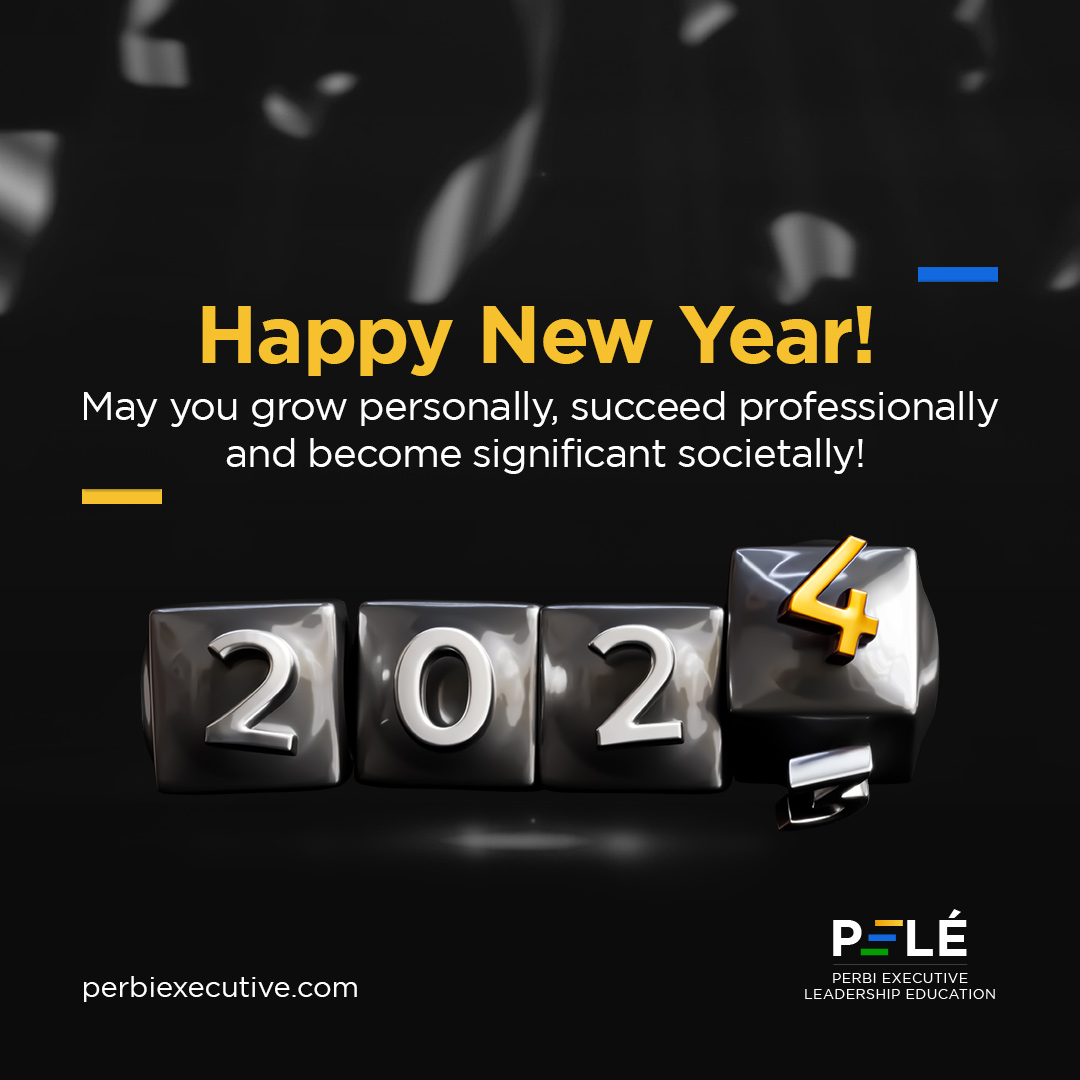
Guard Your January!
Happy New Year! Welcome to the first blog of 2024, a pep blog. The equivalent pep talk is available on Youtube here. Now, this is the the bottomline of this debut communication: Guard your January. Guard your January!
I noticed this many years ago, maybe 15 years ago, that as January go so does the rest of the year. And so although a lot of people take quite a while to get out of the yuletide mood and year-end festivities I realized over a decade ago that by the second day of the new year I needed to grab a hold of myself and start thinking about the rest of the year, prayerfully planning etc.
So for instance at The HuD Group, a holistic emerging leadership development organization I co-founded 20 years ago and now has has work in about 25 countries on all continents, one thing we do and mobilize others to join us in is that from the 2nd to the 22nd of January every year we have a focused time of fasting and praying. We call it P3 or PPP because it’s a time of Prayer, Purpose and Planning.
Now, even if you’re not a person of faith you probably still agree, at least, that you are not just a piece of matter. You are here by the intentional creation of an intelligent Designer who has you here on purpose to fulfill His mission for your life. And so, think about your God-given purposes in January. Why are you here on Earth? Why has God given you another year? (Not everybody made it into 2024, don’t forget).
If you need some guardrails, you’re here to reflect your Creator in your being and your doing and so think about your purpose in 2024 in terms of
–Character (will you be a godly or God-like leader? In what ways?)
–Community (who are you going to intentionally hang out with this year, from family and friends to fellowships?)
–Celebration (what’s going to be the central joy of your life, ultimately how are yougoing to bring delight to your Creator a.k.a. worship)
–Contribution (as one “born to rule through service given” how are you going to lead differently in 2024?)
–Commission (you have an obligation to form godly, effecual leaders too; and better still when you can do it from the inside out with the redemptive power of God that comes from believing in the finished work of Jesus Christ on the cross).
As you think about these God-given and practical purposes, prayerfully consider each and plan your year accordingly. Don’t just be engaged in activities and running around in January–especially from program to program–because as January goes so does the rest of the year. Personally, I hardly take speaking appointments in January and I rarely travel in January because I realized many years ago that is a time to be focused, to be prayerfully intentional about the rest of the year. Last year I violated that, taking on what I thoutht was an ‘unmissiable’ speaking engagement in Kenya. Let’s just say I paid for it dearly.
May you grow in this practice of putting first things first, and in such a profound way that leads to more success this year and even more significance. Remember: guard your January! That’s my pep talk and blog, my first pep talk and blog, for you in 2024.
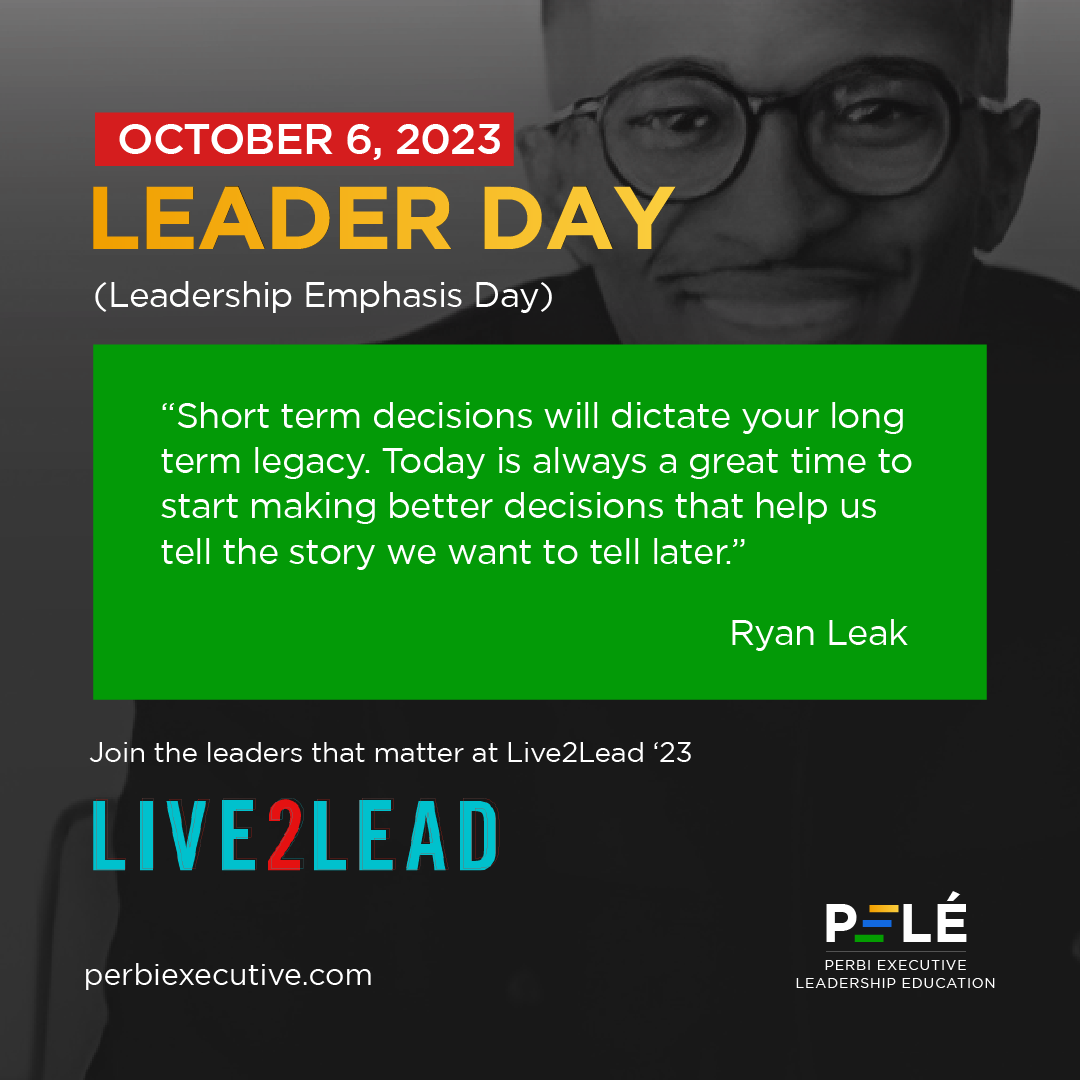
Today is Leader Day. You Don’t Want to Miss the Inspirational Ryan Leak!
Meet Author, speaker, executive coach and film maker, Ryan Leak. Ryan is known for two documentaries, The Surprise Wedding and Chasing Failure. As CEO of a leadership development firm based in Dallas, Texas, Mr. Leak and his team train over 15,000 leaders every year–from Fortune 500 companies to professional sports teams.
Ryan’s passion is helping leaders push past autopilot and level up in their lives and careers. He spreads this empowering message through coaching, speaking, and leveraging the power of video to reach thousands through his online platforms.
As author of the USA Today bestselling book, Chasing Failure, and the Wall Street Journal bestselling book Leveling Up, Ryan and his work have been featured in dozens of media outlets, including Good Morning America and the Today Show.
Mr. Leak is widely known for that one time he planned a viral proposal and wedding on the same day. Most importantly, Ryan is married to his best friend, Amanda, and is the proud assistant coach for his son’s basketball team.
LEAK LIVE AT MAXWELL’S LIVE2LEAD ANNUAL CONFERENCE 2023
Today, the first Friday in October, is LEADER DAY (Leadership Emphasis Day). It is marked by the annual Live2Lead Ghana conference, a brainchild of Dr. John C. Maxwell. And this year, the inspirational Ryan Leak is speaking! You don’t want to miss him. As Perbi Executive Leadership Education (PELE), we have been privileged to host Live2Lead on both sides of the Atlantic, in Montreal, Canada as well as in Accra, Ghana. We are absolutely convinced that leadership is taught; not just caught. Join John and the stellar faculty he’s put together for this year’s Live2Lead conference and up your leadership game.
This year, together with our partners in Ghana, we’ve chosen the theme, “Leading for Legacy.” On legacy, here’s what Ryan Leak’s got to say: “short term decisions will dictate your long term legacy. Today is always a great time to start making better decisions that help us tell the story we want to tell later.” Legacy doesn’t just happen; it’s by intentional, intelligent design. Come and find out how, in-person at the Ecobank Ghana Headquarters in Accra, or online, wherever in the world you might be!
Today, October 6, is Leader Day this year. Register now through this link. Impress upon your organization to join the Leadership Emphasis Day/Leader Day movement that will transform society by becoming a Patron of Live2Lead. A Patron company or individual is one that sends at least 10 leaders to Live2Lead. Together we can change our world for the better! Yes, we can!
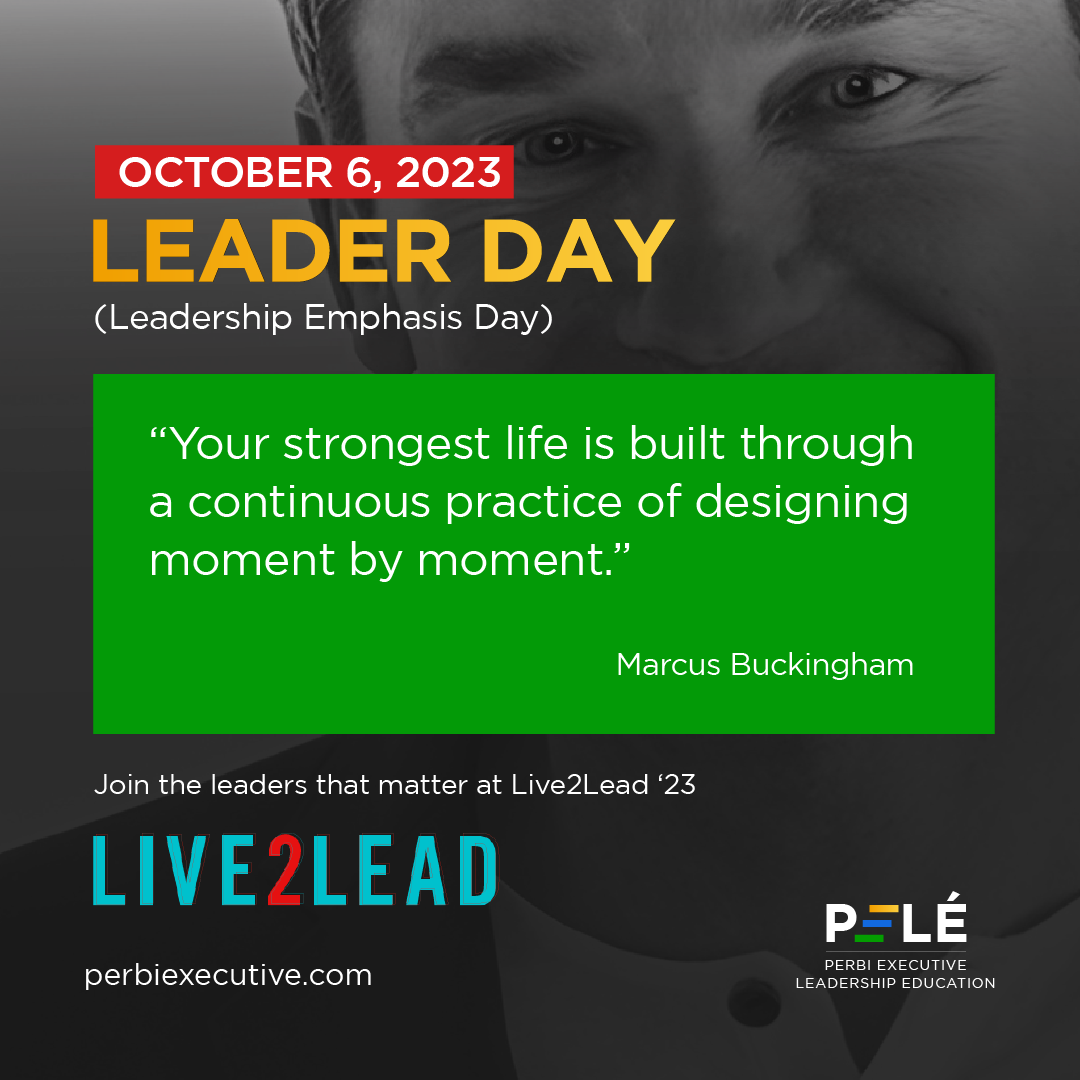
Meet Motivational Marcus Buckingham, Master of Strengths
British best-selling book-writer and arguably “the world’s most prominent researcher on strengths, leadership and high-performance at work,” Marcus Wilfrid Buckingham, is a remarkable individual. If you’ve ever heard of Strengthsfinder, or better still, taken the phenomenal assessment, behold the co-genius behind it! Renowned for his outstanding contributions to the world of work and the fields of technology, innovation, and philanthropy, Buckingham is a global researcher and New York Times best-selling author focused on unlocking strengths, increasing performance, and pioneering the future of how people work. He is the author of two of the best-selling business books of all time, First, Break All the Rules (1999), and Now, Discover Your Strengths (2001), and his tenth book, Love + Work (Harvard Business Review Press, 2022) is a Wall Street Journal bestseller and has been heralded by Forbes as one of the ten must-reads for career and leadership. Marcus’ 2019 Harvard Business Review (HBR) cover article, “The Feedback Fallacy,” was selected by HBR as one of the most influential articles of the last 100 years, and Marcus’ strengths assessments have been taken by over 10 million people worldwide.
Born 1966 in Buckinghamshire in Britain, Marcus displayed an innate curiosity and passion for technology from a young age. After completing his formal education at Cambridge in computer science, Marcus co-founded a startup in the late 1990s that revolutionized the way people interacted with online content. The company’s groundbreaking platform garnered widespread attention and accolades, propelling Marcus into the limelight as a visionary tech entrepreneur. Throughout his career, Marcus remained at the forefront of technological advancements, leading numerous successful ventures and launching groundbreaking products that transformed industries. His dedication to innovation and his ability to anticipate market trends earned him a reputation as one of the foremost technology pioneers of his time.
Beyond his professional accomplishments, Marcus Buckingham has always been deeply committed to making a positive impact on society. He is renowned for his philanthropic efforts, actively supporting various causes related to education, healthcare, and environmental sustainability. Marcus firmly believes in using his wealth and influence to drive positive change and has donated generously to charities and initiatives around the globe. In addition to his philanthropy, Marcus has been an advocate for promoting diversity and inclusivity within the tech industry.
In addition to the self-published short film series Trombone Player Wanted, Buckingham has made numerous television appearances on US television networks and cable channels including The View on ABC, I Want to Work for Diddy on VH1, The Oprah Winfrey Show on syndication, Good Morning America on ABC and The Jane Pauley Show. Marcus Wilfrid Buckingham the English research-based motivational speaker and business consultant is based in California, USA.
BUCKINGHAM LIVE AT MAXWELL’S LIVE2LEAD ANNUAL CONFERENCE 2023
Marcus Buckingham speaks at this year’s annual Live2Lead Ghana, a brainchild of Dr. John C. Maxwell. As Perbi Executive Leadership Education (PELE), we have been privileged to host Live2Lead on both sides of the Atlantic, in Montreal, Canada as well as in Accra, Ghana. We are absolutely convinced that leadership is taught; not just caught. Join John and the stellar faculty he’s put together for this year’s Live2Lead conference and up your leadership game.
This year, together with our partners in Ghana, we’ve chosen the theme, “Leading for Legacy.” Here’s a taste of Marcus Buckingham’s take on legacy: “Your strongest life is built through a continuous practice of designing moment by moment.” Legacy doesn’t just happen; it’s by intentional, intelligent design. Come and find out how, in-person at the Ecobank Ghana Headquarters in Accra, or online, wherever in the world you might be!
October 6 is Leader Day this year. Register now through this link. Impress upon your organization to join the Leadership Emphasis Day/Leader Day movement that will transform society by becoming a Patron of Live2Lead. A Patron company or individual is one that sends at least 10 leaders to Live2Lead. Together we can change our world for the better! Yes, we can!
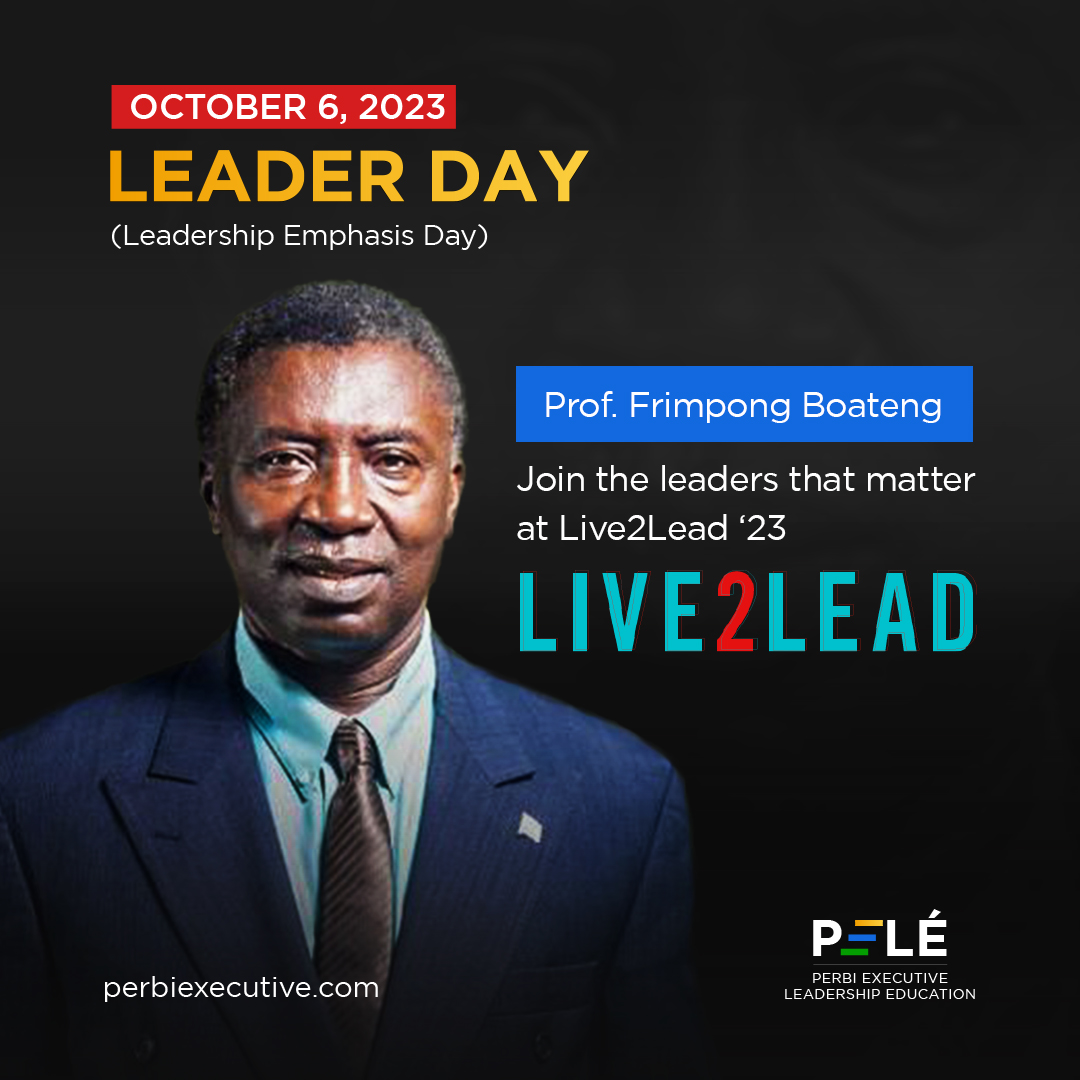
The Father of Open Heart Surgery Opens His Heart at Live2Lead 2023
Professor Kwabena Frimpong-Boateng is an astute German-trained Ghanaian cardiothoracic surgeon and founder of the National Cardiothoracic Centre whose recent foray into Ghanaian politics nearly marred his otherwise stellar legacy. He is also the Founder and President of the Ghana Heart Foundation, erstwhile Chief Executive Officer of Ghana’s premier teaching hospital (the Korle Bu Teaching Hospital, in Accra) and immediate past Minister of Environment, Science, Technology and Innovation for the Republic of Ghana (2017-2021). He has been a Fellow of the Ghana Academy of Arts and Sciences since December 2002.
A STRING OF FIRSTS
The best leaders lead from the power of their life stories, positive and otherwise. Even before Kwabena Frimpong-Boateng would be born, his father Kofi Frimpong died from chest/heart injuries sustained from a road traffic accident. Kwabena was barely four months from birth. It comes as no surprise then that although his first love was engineering, due to his affinity for physics and mathematics while he attended Sekondi College in the Western Region of Ghana, he later would later go the doctor route at university. As if destiny was calling, after the University of Ghana Medical School and housemanship, he was offered a scholarship to study general, cardiothoracic and vascular surgery in Germany. As Frimpong-Boateng figured he could help people with heart situations like his late father, he took the opportunity to sharpen his craft and deepen his calling at the Hannover Medical University in Hannover.
So forty years ago, in 1983, Kwabena Frimpong-Boateng and his team of professors did their first heart transplant on a human being and then performed his first transplant as the lead surgeon in October 1985. This made him the first Black doctor to perform a heart transplant, earning him the nickname the “Black Pearl.”
At the time, he was recognized worldwide for this feat and as if that was not enough, in November 1988, three years later, he struck another first: the first heart-lung transplantation in Hannover. After finishing his post-graduate studies, despite being in very high demand in Europe, he chose to return to the land of his birth to practise as Ghana’s first locally based cardiothoracic surgeon. Frimpong-Boateng performed the first open-heart surgery in Ghana using the heart-lung-machine.
Even away from the hospital, as a farmer Frimpong-Boateng established the first ostrich farm in Ghana, in the village of Dedukope, in the Volta Region of Ghana.
SPEAKING OF LEGACY
Translating his personal success into societal significance, in 1989 he set up the National Cardiothoracic Centre at the Korle Bu Teaching Hospital and was commissioned in 1992. There were no cardiothoracic surgery facilities in the country at the time and this was really avant garde for a country still struggling with primary health care issues such as mosquito-bourne Malaria and childhood vaccinations. Today, people head to the centre from all over the continent for cardiothoracic attention and is now recognised by the West African College of Surgeons to train heart surgeons, cardiologists, cardiac anaesthetists, operating room nurses, intensive care nurses, cardiac technicians, and other cardiothoracic technicians. As a practicing Christian, he has said that his work on the foundation of the National Cardiothoracic Centre was God’s purpose in his life.
One of the greatest way to pass on legacy is by teaching others. Frimpong-Boateng joined the University of Ghana Medical School as a lecturer in 2000 and was promoted associate professor the same year. He was made a full professor in 2002. He also served as the head of the Department of Surgery at the University of Ghana Medical School, prior to his appointment as the Chief Executive of the Korle-Bu Teaching Hospital in 2002. The Ghana Heart Foundation, which he also founded, raises funds to pay for heart surgery for some indigent Ghanaians who cannot afford the cost of such specialized surgery.
Again, he has done well, in terms of passing on legacy, by authoring a couple of biographical books, Deep Down my Heart: A History of Cardiothoracic Surgery in Ghana and Taming the Monster, a treatise on managing Ghana’s behemothic premier teaching hospital.
In March 2006, Prof. Frimpong-Boateng unsuccessfully sought nomination as the candidate of the New Patriotic Party (NPP) for the December 2008 national presidential elections. Regardless of his results, he declared he was still concerned with political issues in relation to education and health problems and would later become a Minister of State. Yet he regrets that political corruption in Ghana is too much and opines that politicians are not taking social priorities into account, especially the need for technology. His foray into the deep and often turbulent waters of politics, especially as chairman of the inter-ministerial committee on illegal mining in the country, nearly marred his enviable legacy of pioneering and impactful lifework. In a recent interview with the Africa Watch magazine, he boldly declared, “Impunity rules in Ghana.”
The erudite professor has had several local and international awards over the last four decades, including two honorary doctorates. Frimpong-Boateng and his wife, Agnes, have five children, some of whom are doctors also.
PROF. FRIMPONG-BOATENG AT JOHN MAXWELL’S LIVE2LEAD ANNUAL CONFERENCE 2023
The good professor speaks at this year’s annual live2lead Ghana, a brainchild of Dr. John C. Maxwell. As Perbi Executive Leadership Education (PELE), we have been privileged to host Live2Lead on both sides of the Atlantic, in Montreal, Canada as well as in Accra, Ghana. We are absolutely convinced that leadership is taught; not just caught. Join John and the stellar faculty he’s put together for this year’s Live2Lead conference and up your leadership game.
This year, together with our partners in Ghana, we’ve chosen the theme, “Leading for Legacy.” Speaking of legacy, in the said interview with the Africa Watch magazine, Prof. Frimpong-Boateng said, “Life is not all about fame and money, but more importantly, what one can do to help others.” He also recently wrote An Open Letter to Anybody Who Wants to be President of Ghana in 2025. Among other things, words that bordered along legacy were the following: “…the success of true leadership is measured by what extent the people can be mobilized to lead independent lives: to feed, shelter, clothe, heal, and defend themselves, and also produce tools, implements, spare parts and machines they require for daily living, so that if for one reason or the other ships and airplanes are unable to access the country the citizens can stand on their own and survive.” Come and find out how to truly lead successfully, in-person at the Ecobank Ghana Headquarters in Accra, or online, wherever in the world you might be!
October 6 is Leader Day this year. Register now through this link. Impress upon your organization to join the Leadership Emphasis Day/Leader Day movement that will transform society by becoming a Patron of Live2Lead. A Patron company or individual is one that sends at least 10 leaders to Live2Lead. Together we can change our world for the better! Yes we can!
Register HERE, NOW.
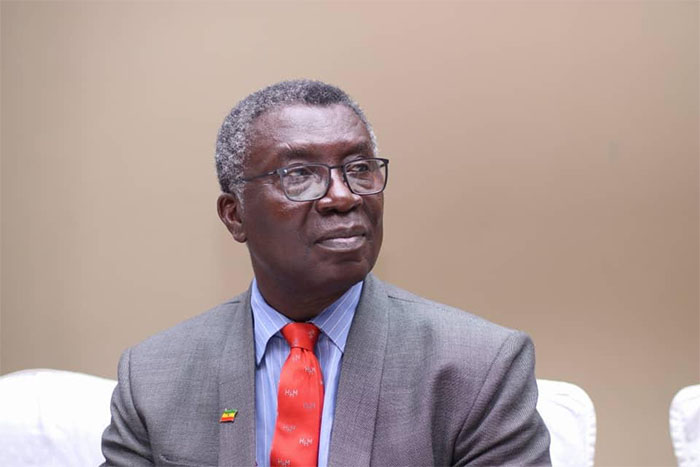
Open Letter to Anybody Who Wants to be President of Ghana in January 2025 by Prof. Kwabena Frimpong-Boateng
Ghana has not done as well as it should have done since President Kwame Nkrumah was unconstitutionally ousted from office through a military coup by the National Liberation Council on February 24, 1966. Ghana has had three other interruptions of governments. The present 4th Republic, dominated by the National Democratic Congress (NDC) and the New Patriotic Party (NPP), has not brought the transformational change that will put the country on path of sustainable development and prosperity for its people.
I dare say that the fight ahead of Ghana is greater than the fight for political independence and its people cannot be won with leaders who lack the zeal, commitment, conviction to confront their own demons and other forces and headwinds that are against the development of the country.
It is always said that one cannot re-invent the wheel and I believe in that old adage. I present here examples of what happened elsewhere on this planet not too long ago. I personally believe that the country can make progress when we get leaders who exhibit the qualities in the examples that follow.
The first example of transformational leadership is from Singapore. When the government of Lee Kuan Yew took office in 1959 it set out to have a clean administration. The Prime Minister said that “we were sickened by the greed, corruption, and decadence of many Asian leaders” and “We had the deep sense of mission to establish a clean and effective government”. This was a solid commitment from the newly elected Prime Minister. With determination and a credible program committed to scientific and technological development, Lee Kuan Yew and his team were able to live up to their good intentions and Singapore, which in 1819 was a village with 120 fishermen without natural resources and hinterland, propelled itself from third world squalor to first world affluence in just 35 years. This was commitment and a sense of mission personified.
The second example is from China. The economic development taking place in China is the result of an initiative taken by four scientists. On the 3rd of March 1986, four of China’s top weapons scientists: WANG Daheng, WANG Ganchang, YANG Jiachi, and CHEN Fangyun, jointly sent a private letter to Deng Xiaoping, the leader of the country, with a warning that decades of relentless
focus on militarization had crippled the country’s civilian scientific establishment. They recommended that China must join the world’s “new technological revolution,” or it would be left behind. They called for an élite project devoted to technology ranging from biotech to space research. Mr. Deng Xiaoping agreed, and scribbled on the letter, “Action must be taken on this now.” This was China’s “Sputnik moment,” and the project was code-named the 863 Program, for the year and month of its birth. In the years that followed, the government pumped billions of dollars into labs and universities and enterprises, on projects ranging from cloning to underwater robots. The program initially focused on seven key technological fields: Biotechnology, Space technology, Information technology, Laser technology, Automation, Energy, and Advanced Material Sciences.
Two more fields were brought under the umbrella of the program: Telecommunications (1992) and Marine Technology (1996).
In 2006, Chinese leaders redoubled their commitment to new energy technology; they boosted funding for research and set targets for installing wind turbines, solar panels, hydroelectric dams, and other renewable sources of energy that were higher than goals in the United States. China doubled its wind-power capacity that year, and then doubled it again the next year, and the year
after. The country had virtually no solar industry in 2003; five years later, it was manufacturing more solar cells than any other country, winning customers from foreign companies that had invented the technology in the first place.
Korea transformed itself from a stagnant agrarian society into one of the most dynamic industrial economies of the world within 40 years. In the early 1960s when Korea first launched its industrialization efforts, it was a typical poor developing country with poor resources and production base and small domestic market. Korea’s Gross National Product (GNP) in 1961 was only $ 2.3 billion (in 1980 prices) or $87 per capita which came mainly from the primary sectors. The manufacturing sector’s share of GNP remained at a mere 15%. International trade was also at a very infant stage: in 1961, Korea’s export volume was only $55 million and imports $390 million. As late as 1970, the three top exports were textiles, plywood, and wigs. South Korea now has established world prominence in such technology areas as semi-conductors, Liquid Crystal Display (LCD), telecommunication equipment, automobiles, shipbuilding, and many more. Indeed, it has emerged as one of the key international players in the global economy and is considered the 13th largest economy and one of the major trading countries of the world.
The last example is from the United States of America. When the 56 signatories of the Declaration of American Independence met in the State House of Pennsylvania in Philadelphia on the 4th of July 1776 to append their signatures to the famous document on declaration of America’s Independence this is what they said: “And for the support of this Declaration, with a firm reliance on the protection of divine Providence, we mutually pledge to each other our Lives, our Fortunes and our sacred Honor”.
The signers of American Declaration of Independence, twenty-three lawyers, fifteen merchants, five plantation owners, four physicians, three scientists, two land speculators, one farmer, one military man, one lawyer/musician and one Minister, showed tremendous courage and bravery by willingly putting their names on that document. They knew full well that they were committing treason against England and they knew the penalty was death. Their commitment to the United States of America led to the creation of what is still the richest and most powerful country in the world. Ghana has not yet seen the type of closed, united, committed, focused, and dedicated leadership that is ready to sacrifice for future generations of Ghanaians. We have not had leaders who see beyond the next elections and plan for future generations. If a few leaders of this country, relying on the protection of divine providence, would mutually pledge their lives, fortunes, and sacred honor for the development of Ghana, there would be a palpable change within 2 years. May be there is no sacred honor or fortune to pledge on.
The political corruption that is gradually gaining root in Ghana is very disturbing. When it comes to choosing leaders to run the political parties and the nation it is no more a question of looking for selfless and competent individuals who have what it takes to move the nation forward. It is more of who is loyal to powerful individuals who want their interests to be served after the power
is won.
I expect anyone who wants to lead this country to tell the nation now how things are going to be done differently so that young people would begin to have hope and stake in this country.
Our leaders have devalued themselves to the extent that they think only foreigners can help us out of our misery. How can someone tell us that he is waiting for a loan from some other countries before roads, schools and other infrastructural projects can be executed?
Our leaders seem to know it all and can develop this country without Ghanaians. After all they do not need Ghanaians to travel around looking for loans, grants, and handouts. They do not need Ghanaians to build the infrastructural projects. As it is, those who give out the loans also provide the highly qualified and skillful workers from their country to get the work done.
Our leaders’ understanding of development seem to be only the provision of infrastructure. No country ever developed by borrowing to build infrastructure. ‘Something’ else must be built on the infrastructure. That something is the true development.
As far as I am concerned the many roads, interchanges, schools, hospitals, wells, electricity, and other infrastructural projects, erroneously called development projects, do not alone determine the success of a Government. Rather the success of true leadership is measured by what extent the people can be mobilized to lead independent lives: to feed, shelter, clothe, heal, and defend themselves, and also produce tools, implements, spare parts and machines they require for daily living, so that if for one reason or the other ships and airplanes are unable to access the country the citizens can stand on their own and survive.
We need attitudinal change. We should realize that the overall development of the nation, including the economic, social, cultural, and technological development is the responsibility of the Ghanaian. Mr. Future President, the men, and women to solve the myriads of problems facing us are here at home and in the diaspora. They have to be found and encouraged to perform. The task of political
leadership is to unearth the actors needed to transform the nation. If we say we have the men, let us use the men and not the boys.
We should exorcise the ‘beggar mentality’ from our lives and accept that our poverty is self-inflicted and it is absolutely unnecessary.
We pride ourselves as having been endowed with abundant natural resources. That is true but it is also important to know that natural resources have no natural owners. The real owners are those that have the technology, skills, and the financial power to exploit those resources. They are the ones that take 90% of the mineral and other resources and leave a mere 10% for the host country.
It really beats my understanding that our leaders do not seem to realize that the real difference between the developed countries of America, Europe, Asia and the Far East and the underdeveloped countries of Africa lies in their technological capability. This capability has been defined as the extent to which countries access, utilize, and create science and technology for the solution of socio – economic problems. Technology has the track record of solving developmental problems. Our modern world is driven by technology. Energy, agriculture, medicine and health, clean air and water, transportation, sanitation, management, utilization, and conservation of natural resources — all are based ultimately in science and technology. So, it is obvious that to be a part of that world, there must be science and technology elements in the development process.
Despite efforts to alleviate poverty, Ghana still exhibits chronic inability to alleviate poverty. Poverty alleviation means, for many people, being able to afford nutritious food, access to clean water and sanitation, energy, safe shelter, education, and a healthy environment. Since science and technology have a historical record in providing solutions to poverty problems, any efforts to alleviate poverty will not succeed without innovations in food production, water, energy, and health provision and in general economic growth. We must understand that Science, Engineering and Technology will give us the capacity to manufacture machines, develop processes and materials and exploit our abundant natural resources for national development. If we do not develop the capacity to manufacture machines that will work for us, we should as well forget about any dream of developing the Nation. No country ever developed without the capacity to manufacture machines. If we characterize Ghana as an agricultural nation, we do so by default because we cannot do anything else. We will continue to run the Adam and Eve, Cain, and Abel economy: planting yams and rearing animals. We have not advanced to Noah’s economy. He built a sophisticated ship that saved humanity and other forms of life. About 2200 years ago, the Chinese built the over 6300km Great Wall of China, without any assistance from the World Bank but we in the 21st Century have closed our minds to technology and need assistance to construct everything, including toilets. We need to constantly remind ourselves that the POVERTY GAP is a TECHNOLOGY GAP.
Again, our development should be driven by our ability to understand, interpret, select, adapt, use, transmit, diffuse, produce, and commercialize scientific and technological knowledge in ways appropriate to our culture, aspirations, and level of development.
Ghana needs a new brand of leadership. It is unacceptable that about 80% of inputs into agriculture, education and health are from foreign sources. It is a shame that a major thrust of our economic policy is to try as much as we can to attract foreign investors. Good as foreign investments are we just cannot sit down and think that without confronting our problems ourselves we can still be prosperous.
To my mind Ghana is unable to attract significant Foreign Direct Investments (FDI). Any country that does not take the development of her human capital seriously finds is difficult to attract Foreign Direct Investments (FDI). The high-income developed countries with well-developed human capital are not only the major source of direct investment, but they are also the major recipients. China and the United States of America are the major recipients of FDIs in the world.
There is ample evidence that multinationals are more active primarily between similar, high-income countries and that outward direct investment in particular is associated with skilled-labor abundance. Even when a multinational decides to invest in a developing country with low human capital base the type of investment is the vertical one in which the production process is geographically fragmented by stages, the capital-intensive intermediates being produced in the home country of the multinational and the labor-intensive stage produced in the host country. This is in contrast to the horizontal investments in which the multinational carries on basically the same activity in the host country as at home, for example, German investors producing the same cars in the United States of America as they do in Germany. This type of investment is almost non-existent in Ghana.
Finally Mr. Future President, I believe that the greatest asset of a nation is the trust and confidence of its people. This should, however, not be taken for granted. Leadership must also fight for this great asset by working hard with even-handedness for the people in all honesty. This asset has been and still is being squandered through misgovernment and corruption to the extent that leaders are not trusted and citizens do not see that they have a stake in their country and its future.
Most Ghanaians do not see any virtue in working for the future of their country. Our leaders have not been able to invoke in the citizens the spirit of nation building. Mr. Future President how are you going to rectify this situation?
God bless our homeland Ghana and make our nation great and strong.
A PELE Note
Prof. Kwabena Frimpong-Boateng is an astute German-trained Ghanaian cardiothoracic surgeon and founder of the National Cardiothoracic Centre whose recent foray into Ghanaian politics nearly marred his otherwise stellar legacy. This Open Letter was written by the good professor on 31st August, 2023. Perbi Executive Leadership Education (PELE) contacted him for his original typed up version on September 20, 2023 to republish here in toto, unedited whatsoever. He is scheduled to speak in-person at the John Maxwell Live2Lead Conference in Ghana on Friday October 6, dubbed Leader Day.

Behold Kendra Scott–Builder of a Billion Dollar Legacy from a $500 Budget!
Kendra Scott (born March 27, 1974) is an American fashion designer, founder,former CEO, executive chairwoman, and philanthropist. Kendra Scott, née Baumgartner, started her company (named after her) in 2002, just three months after her first son was born, with only $500. Going door-to-door to Austin, Texas, boutiques armed only with a tea box full of her jewelry, Kendra captivated businesses and customers with her vibrant personality and unique eye for design. Known for her dynamic use of color and genuine materials, Kendra’s commitment to innovation, quality and detail has brought her from a small start-up to a billion-dollar business and has won over loyal fans, media and celebrities alike.
With over 2,000 employees, Kendra Scott boasts of a thriving web business and over 100 standalone stores and has expanded beyond fashion jewelry into the categories of fine jewelry, home decor, and beauty. Today, her company continues to operate out of Austin, TX, with their state-of-the-art corporate office complete with design lab and an industry-leading distribution center both catering to her employees’ career goals and family-life balance.
With Family and Fashion as two core pillars of her business, Kendra maintains a focus on her other core pillar of Philanthropy in all she does. Since 2010, the company has given back over $40 million to local, national and international causes. In 2018 alone, the company gave over $5 million in monetary donations, almost $10 million in in-kind donations, over 2,000 volunteer hours to philanthropic organizations, and partnered with more than 8,000 philanthropic organizations nationwide.
Kendra has been awarded with the EY Entrepreneur of the Year 2017 National Award; the Breakthrough Award from the Accessories Council Excellence Awards; named Outstanding Mother of the Year by the Mother’s Day Council; awarded Texas Businesswoman of the Year by the Women’s Chamber of Commerce; listed by Forbes as one of America’s Richest Self-Made Women; Top 100 Entrepreneurs of the Year by Upstart Business Journal; Best CEO by Austin Business Journal; and Honorary Celebrity Chair for the Ronald McDonald House Charities of Central Texas. She is a member of the Council of Fashion Designers of America and maintains her position as Executive Chairwoman of the Board of Kendra Scott, LLC, the 1-billion-dollar company she founded and was CEO of until she passed on the baton. In 2019, Madam Scott became only the 12th woman in her state to be inducted into the 40-year old Texas Business Hall of Fame. Kendra has a 2022 book entitled, “Born to Shine: do good, find your joy, and build a life you love.”
KENDRA SCOTT AT JOHN MAXWELL’S LIVE2LEAD ANNUAL CONFERENCE 2023
Kendra Scott speaks at this year’s annual live2lead Ghana, a brainchild of Dr. John C. Maxwell. As Perbi Executive Leadership Education (PELE), we have been privileged to host it on both sides of the Atlantic, in Montreal, Canada as well as in Accra, Ghana. We are absolutely convinced that leadership is taught; not just caught. Join John and the stellar faculty he’s put together for this year’s Live2Lead conference and up your leadership game.
This year, together with our partners in Ghana, we’ve chosen the theme, “Leading for Legacy.” Here’s Kendra’s take: “Focus on what lights a fire inside of you and use that passion to fill a white space. Don’t be afraid of the challenges, the missteps, and the setbacks along the way. What matters is that you keep going.” Come and find out how, in-person at the Ecobank Ghana Headquarters in Accra or online, wherever in the world you might be!
October 6 is Leader Day this year. Register now through this link. Impress upon your organization to join the Leadership Emphasis Day/Leader Day movement that will transform society by becoming a Patron of Live2Lead. A Patron company or individual is one that sends at least 10 leaders to Live2Lead. Together we can change our world for the better! Yes we can!
Register HERE, NOW.
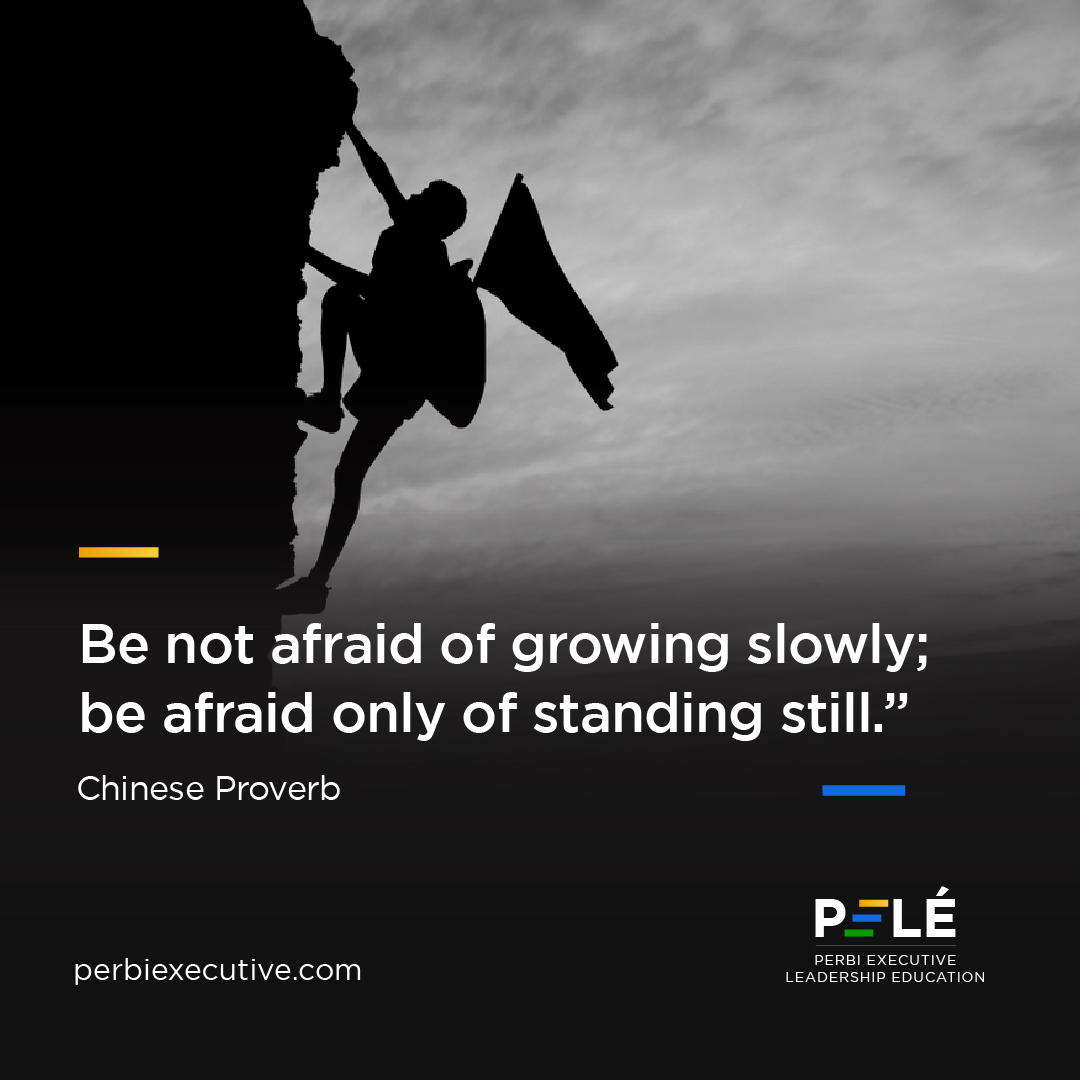
Big Events are Overrated, Trust Process.
“Trust the process” has become cliché. Yet many don’t understand it, let alone mean it. In fact, most people are more attracted to big events and striking occasions but the aim of this article is to show that these are overrated. We are attracted to the big bang, amazing testimonies, the one time lottery win, that miracle… all of which are good but in the long term, those are not the things that sustain societies, grow businesses or deeply transform us long term. It is process, process, process.
MENTORING AND THE LAW OF PROCESS THEN
These thoughts have been coming to mind over the last couple of weeks because of two recent incidents, one in the church and one in the corporate setting. Regarding the former, l led part of an annual discipleship capacity building workshop for my local church at the University of Ghana. Discipleship is the word Christians use for spiritual mentorship. I inquired what they would do if they were God and came on Earth in the person of Jesus Christ (as Christians believe) to do an effectual job of changing the world. What would they do?
Well, many would go head-on and prioritize filling stadia with people (and there were stadia in the time of Jesus) or fill the plains like where he fed 5,000 then 4,000 (not counting women and children) day after day, as the rule not the exception. Some would constantly go to the royal palace and do some leadership workshops for Herod and his ilk etc. But the Rabbi did none of that routinely. First of all, He took 30 years to prepare Himself from conception through childhood to turbulent youth years to adulthood. He came as a foetus, endured nine months of pregnancy and went through a 30-year process of learning–of obeying His parents, of apprenticing to be a carpenter like His earthly dad, of learning the Torah like other children of His day etc. Yes, all of that. Process.
Eventually when it was time to launch His ministry at 30 (phew! finally!) what does He do? Nothing prime-time TV worthy (oh, of course apart from His spectacular baptism). The baptism in the Jordan by Cousin John was a big event. But the rest, again, process. After all-night prayer, He goes around town and handpicks 12 people, just a dozen, and decides to walk with them, life-on-life, for three-and-a-half years. As Professor Robert Coleman points out in his magnum opus, His method of training was His life itself, it wasn’t just “read this book.” No! Process, day by day by day by day by day for nearly as long as we have to wait for the next Olympics or World Cup tournament.
Only a few years down the line these ordinary fisherfolk so got Him that each was martyred for what they had come to see and taste and know. In a few years, it was reported of His followers, “the people that have turned the world upside down.” Two thousand years later, what do we see? There are 2. 3 billion Christ followers on every continent and in every country and geopolitical space today. Yet the original leader Himself never travelled beyond 50-100 km radius of where he was born. The farthest he went to was Egypt, in His childhood, when his family temporarily migrated to Africa as refugees. Why this impact? How? The law of process.
He knew if he took 12, focused on the few and worked on them life-on-life for years, that the few would bring another few who would bring a few more, who would mentor a few, who would bring a few and over years this kind of impact would happen. Deep transformation doesn’t happen in rows, like we sit in events, but in circles. It happens in circles, small groups, day by day, week after week, month after month.
MENTORING AND THE LAW OF PROCESS NOW
At the said workshop at the University of Ghana, I showed the attendees a simulation: if one person who comes has a relationship with the Lord Jesus Christ decides to disciple another person, just one person per year, life on life, week by week, studying scriptures, eating together, praying together, travelling to places together etc. Just a person a year. At the end of the first year, there would be only two disciples of Jesus. The original then instructs the ‘graduating’ disciple to do same for another, just as Paul admonished Timothy: “And the things that you have heard from me among many witnesses, commit these to faithful men who will be able to teach others also” (2 Timothy 2:2 , NKJV).
At the end of the second year what happens? You still mentor a second person so there are two of you. But the original person you discipled in the first year has now also discipled somebody else, thus there are four of you. First year it was just addition, the second year there was multiplication. By the third year and onwards, there isn’t just multiplication but exponential multiplication. And if it continues like that, just one person each annually, by the end of the tenth year, you would be over a 1000 people (quantitatively impressive) deeply transformed (qualitatively impactful). You’ve gotten the mass that you wanted, yes, a thousand people you would have wanted to fill an auditorium with to impact all at once (but would leave the program and achieve nothing). Now you’ve gotten that same 1,000 people after a decade but they would be solid movers and shaker.. It may seem inefficient at first but it is deeply effective and with time it becomes powerfully efficient as well. Within 10 years, you would have a 1000 people who are deeply transformed and now you also have the numbers. That’s the law of process.
MONEY AND THE LAW OF PROCESS NOW & THEN
Then, about the training for the core leadership team at Perbi Cubs we talked about how leadership is built day in and day out and not in a day. John Maxwell talks about that as the fourth ‘irrefutable law’ in his New York bestselling book, The 21 Irrefutable Laws of Leadership. I have been teaching this book for over 20 years now. “Leadership is built daily and not in a day,” Dr. Maxwell says. So is anything else of enduring value. Daily; not in a day.
To illustrate, I actually showed the EdTech leaders an investment chart I created a couple of decades ago in my book Financial Whizzdom, comparing a youth who starts investing at 20 and his uncle who starts investing at 30. Both invest the same amount (say GHS 2,000) at the same annual interest rate of 10% p.a. The lad invests for 10 years, stops investing but leaves the money to keep growing. The uncle who started at 30 doesn’t stop and continues putting in GHS, 2,000 every year till the age of 65. At the age of 65, this boy who started and stopped and just let his money keep growing would have more money, about GHS 200,000 more, than his uncle. All because the young man started earlier and got the Law of Process working for him a whole decade prior.
CONCLUSION
Process works. It gives sure and deep and lasting results. Don’t skip processes. Build your leadership daily. Build your spiritual life daily. Build your health daily. Build your intellectual capacity with a little reading everyday rather than just binging once or twice a year. Something you are doing everyday is determining your future. Or as Tag Short put it, “the secret of success is found in your daily agenda.” A related Chinese proverb really intrigues me. Here’s my paraphrase: “Do not fear growing slowly, what you should fear is standing still, not growing at all.” Trust the process. Truly, trust process. Process would beat big events and one-time shiny experiences any day, all day, long-term. It’s a timeless, universal truth. Trust it.
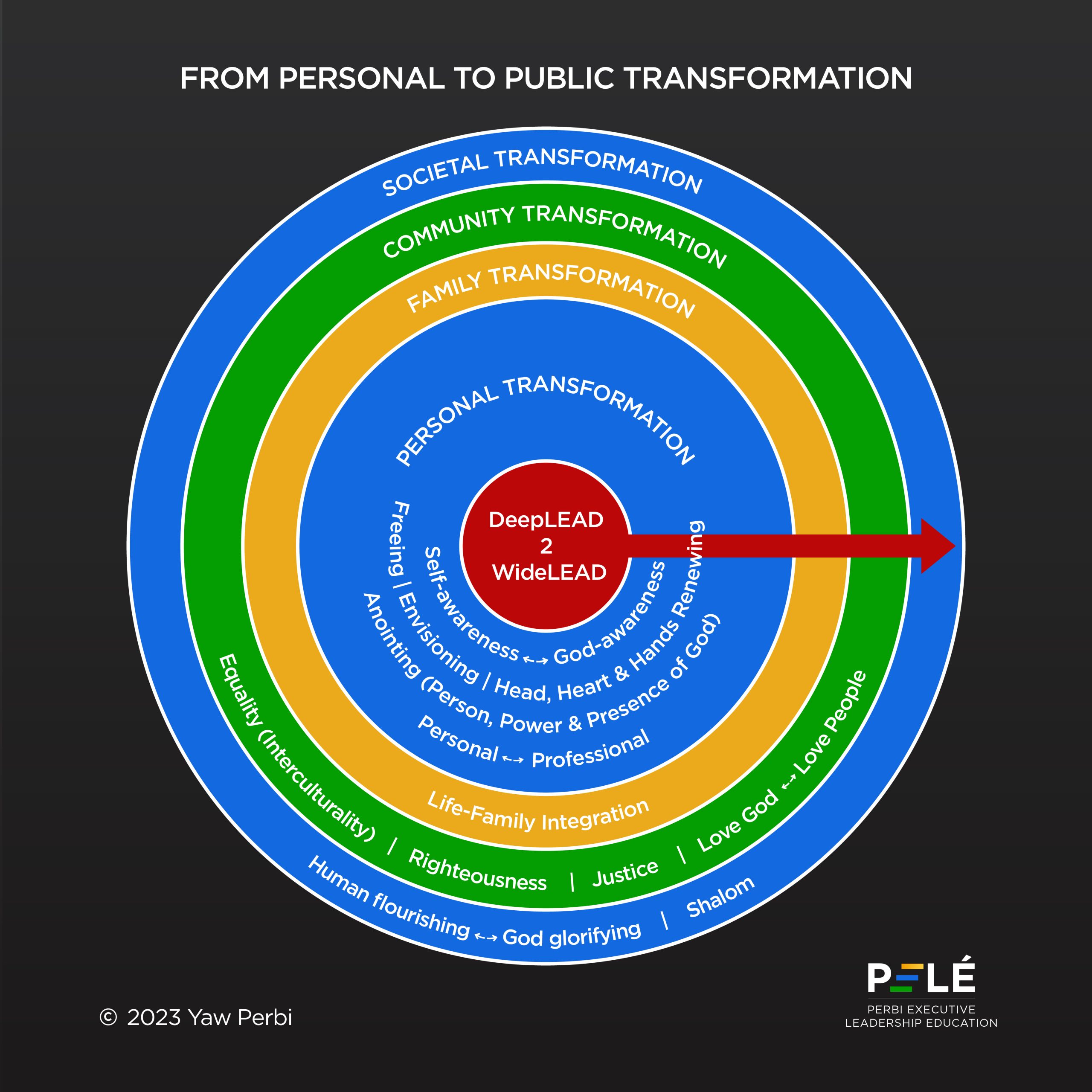
The Throes & Trajectory of Transformational Impact
Over 500 American-Africans—my way of describing Africans who have more recently in the last one or two generations become Americans—gathered in no less a place than the Lord Baltimore Hotel in the downtown of that Charm City of Maryland which bears the same name as the hotel. One of the interesting trivia that decorated the elevators at the hotel is that Martin Luther King Jnr. held his April 2, 1965 press conference at this same historic venue.
The theme chosen for this biannual national conference of these American-African professionals known as the African Christian Fellowship (ACF) USA was Transformational Impact. Yours truly was one of two keynote speakers, who both happened to be medical doctors who hailed from West Africa, Ghana and Nigeria specifically.
While my first keynote was an hour-long and had seven points about transformational impact—text, tales, theology, tracks, teleological definition, theory and tenets—I only seek to share the crux of the key note with you in this short write-up. I shall share the teleological definition of transformational impact which I came up with after reading many others online and found none fully satisfying my take on the subject. And then I’ll share my theory of change, theory of how transformational impact actually happens.
Definition of Transformational Impact
Transformational Impact is the process of deeply internally changing in one’s being and doing in order to have, or participate in an attempt at, external profound, authentic and sustainable positive change. If you are anything like me, when you hear transformational impact you’re thinking about doing some thing to change something or someplace or someone. The paradigm shift in this definition is that transformational impact has two points of change—first, of the person seeking an intervention and then of the circumstance or situation. That brings us to the theory of change.
Theory behind Transformational Impact
Why is this definition like this and super important? Because we cannot deeply change anything without being deeply changed ourselves first. Here is the theory of change that goes with the issue of transformational impact: Only deeply transformed leaders can deeply, authentically and sustainably transform society.
This is not the first time I’ve written on this. I remember bringing it up when there was a massive trending in Twittersphere of the hashtag #fixthecountry in a certain West African state and a counter #fixyourself that was attempted to quench the fire. In the article, I share why both camps were wrong. It goes back to the theory behind transformational impact.
There cannot possibly be authentic transformation when the actor isn’t themselves in sync with what they’re acting upon. Besides, if there isn’t transformation of the protagonist themselves, their intervention wouldn’t last long—either their work will unravel with time or they themselves will be marred in no time.
You might now understand why this definition is important. One’s identity and character (being) and actions and activities (doing) first need below-the-surface transforming internally in a deep manner if the outward impact they seek will also be profound, real/authentic and last.
In fact, without going too much into the theology of transformational impact, let me state that God first shapes the people through whom He wants to shape the world so that they can reflect Him and reform His world by His shaping—in His image and likeness—to His glory.
Widening Circles of Transformational Impact
Above is an attempt to illustrate how it’s a DeepLEAD at the core which leads to WideLEAD, from personal transformation to public transformation. We can’t go wrong if it’s first our deep personal transformation that leads to family transformation, community transformation (from church to corporation) and then societal transformation.
Elsewhere I’ve written about how people like William Wilberforce, Zaccheus the Tax Man and Nelson Mandela transformed their societies and world because they had first been deeply transformed. In fact, the title of an opinion piece on Nelson Mandela in the Los Angeles Times which I really enjoyed captured the essence of transformational impact so succinctly: “Nelson Mandela transformed himself and then his nation.”
So did Martin Luther King, who first darkened the doors of the Lord Baltimore Hotel a whole 60 years before I and the 500 plus American-Africans would a couple of weeks ago. Where any of these transformationally impactful leaders missed a step in the transformational impact process, they too paid for it in their personal, family, community or national life. Principles are no respecter of persons or personalities.
Change First to Carry Forth Change
So now’s your turn. Your time has come. Change first personally to carry forth change societally. Former U.S. President Barak Obama and I differ when it comes to LGBTQI+ transformation but we agree on this: “Change will not come if we wait for some other person or some other time. We are the ones we’ve been waiting for. We are the change that we seek.” The astute Jewish lawyer who studied under revered Gamaliel once said, “For the creation waits in eager expectation for the children of God to be revealed.” The whole world waits to be transformed by a people transformed prior and still transforming in the process. We are transformed to bring transformation. How’s that going?

